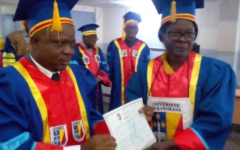Defense of a thesis on neurocognitive functioning linked to “Konzo” disease
2023-07-22 10:26Defense of a thesis on neurocognitive functioning linked to “Konzo” disease
The characterization of the neurocognitive and adaptive functioning of adults exposed to the disease associated with the consumption of bitter cassava (konzo) was analyzed Friday in a thesis for a medical degree at the University of Kinshasa (UNIKIN) in the Democratic Republic of Congo.
"Titleee 'Charactererization of neurocognitive and adaptational functioning of adults exposede to cyanogenic substancesecassava seeds', this thehas as a character objectiveeincrease neurocognitive disorder, factors associated with ites and the slowdown in activitiesedaily life of the adult of Kahemba, one of the environments wherewhere selives with Konzo disease in the DRC», said the author of this thesis, the Hutu works leader Kabamba Bin Kayoka.
This cross-sectional study, he said, was conducted among 406 subjects aged 18 to 73 living in Kahemba territory in Kwango province. They were screened using neurocognitive testing, a neurosomatic clinical examination, and urinary thiocyanate testing as an indication of foodborne hydrocyanic acid poisoning.
The recipient said that the environment where insufficiently retted bitter cassava products constitute the main source of food is characterized, among other things, by chronic malnutrition, chronic cyanide poisoning and the appearance of spastic paralysis called "Konzo».
He emphasized the proper processing of bitter cassava before consumption, including cooking, soaking, fermentation, and roasting. The applicant demonstrated that mild neurocognitive disorders can be associated with difficulties in social integration and contribute to the sustainability of socioeconomic conditions.
Nenecessitye of reeeducation of the population
Dr. Hutu Kabamba also highlighted in the results of this doctoral research the need to take into account and integrate physical rehabilitation of subjects with konzo into the development policies of communities exposed to chronic foodborne cyanide poisoning.
Added to this was the need for nutritional, neurocognitive and social rehabilitation of the entire community. According to the author of this thesis, holistic interventions are essential to minimize exposure to cyanogenic substances in bitter cassava and implement strategies to promote the optimal and harmonious development of the entire community.
The recipient also made recommendations in terms of perspectives aimed at training, care to be administered to the population and scientific research.
Professors Désiré Tshala Katumbay and Daniel Okitundu Luwa were respectively the promoter and co-promoter of this thesis, while the academic session was chaired by the Secretary General in charge of Research at UNIKIN, Professor Émile Ngoy Kasongo representing the Rector, who conferred on the head of work Hutu Kabamba of the Department of Neurology/Neuro Psycho-Pathological Center (CNPP) of the Faculty of Medicine, the grade of Associate Professor of Higher Education in Medicine.

















